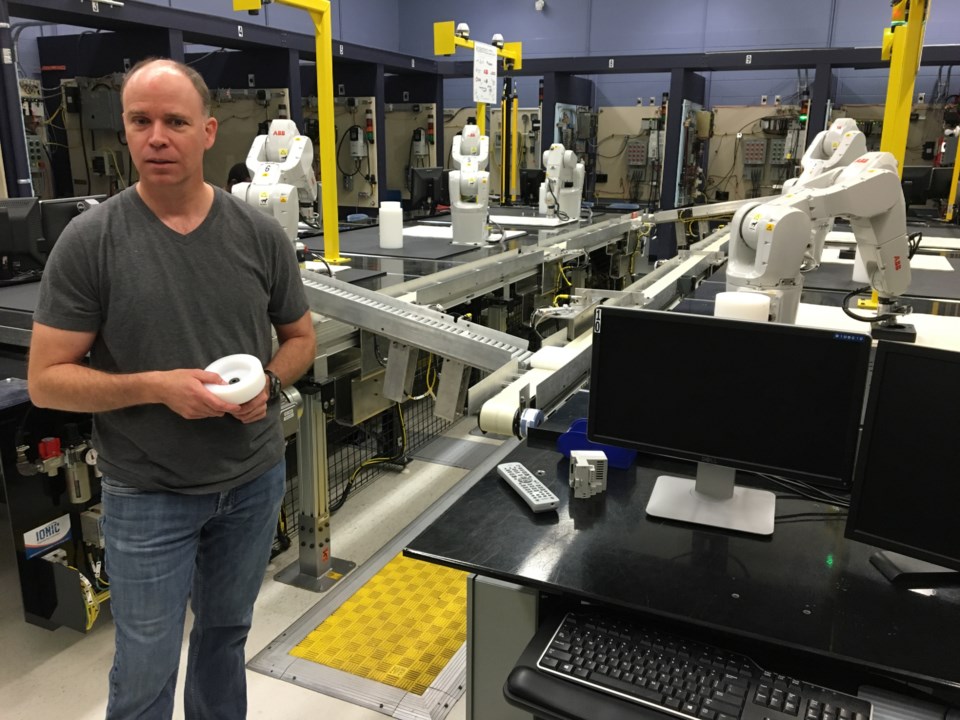Robots are here to stay, and according to studies, will eliminate many jobs around the world over the next few years.
A Ryerson University study in 2016, for example, stated more than 40 per cent of the Canadian workforce is at risk of being replaced by technology and computers.
The top five groups of workers most likely to be hardest hit by automation, according to that report, are retail salespeople, administrative assistants, food counter attendants, cashiers and transport truck drivers.
“There’s always going to be change…and I think people need to adapt to that,” said Jonathan Coulman, Algoma Workforce Investment Corporation (AWIC) executive director, speaking to SooToday at a public tour of Sault College’s robotics lab Friday morning.
The tour was a part of Manufacturing Day Algoma activities, organized by AWIC.
“(In robotics) there are a lot of opportunities not only for programming and setting them up, there are jobs in maintenance of robots,” Coulman said.
“They (people and robots) are working side by side.”
“I’ve been in a lot of manufacturing plants, and most times, robots create jobs because somebody’s got to run them, program them…I don’t know if it’s a one to one ratio, but robots do create jobs,” said Dean Matthews, Sault College robotics instructor.
“Accountants thought spreadsheets would replace them and do everything they do, but it expanded their productivity and increased business,” Coulman said.
Both Matthews and Coulman pointed to mostly unfounded job loss fears people had when workplaces became computerized in the 1980s.
“Usually what I’ve seen is robots allow an operator to stay in the plant and focus on something else, rather than lose his job and be replaced by the robot,” Matthews said.
“He’s usually doing five things, so the robot will do one of his tasks and free him up to do something else better and give more attention to those other tasks rather than replacing him completely. That’s what I’ve seen happen in many plants.”
“I think this is fantastic,” said Dave Solomon, a retired steel plant employee who took the tour as a member of the public, after observing the robotics lab.
“There are so many applications for robots, such as handling materials, and in the last 20 years in ergonomics, reducing wear and tear on people. To have this facility here is wonderful.”
“I know in plants where I have been, where there have been multiple repetitive strain injuries, where they have installed robots to do that manual work, and the amount of injuries is reduced.”
“I think in a lot of cases (robotics) allow plants to remain competitive, so they can reduce costs…in some cases it’s a matter of staying in business,” Solomon said.
The Robotics department at Sault College, set up with funding from Tenaris, has already developed solutions for Pollard Banknote, a lottery and gaming ticket manufacturer located on White Oak Drive East, and Heliene, a solar panel manufacturer on Allens Side Road.
There are a total of nine state-of-the-art robots in action in two labs at the college, made by Switzerland’s ABB Robotics.
The Sault College robotics lab “is a world class lab, absolutely,” Matthews said.
This year, for the first time, Sault College is offering Robotics and Advanced Automation, a one-year, two semester graduate certificate program for students who already possess a two or three-year college diploma or university degree in a related electrical or mechanical field.
14 students are enrolled in the program, Matthews said.
Robots are also currently used by students in the college’s Electrical Engineering Technology Process Automation program.
Along with two public tours at the college Friday, AWIC arranged to have students from Korah Collegiate and St. Mary’s College tour local manufacturers such as Arauco and Pollard Banknote.
Other tours were held at Wesdome Mines (Wawa) and Prestige Glass (Elliot Lake).
An earlier tour of Heliene took place over the summer.
The Algoma Workforce Investment Corporation (AWIC) is one of 25 local workforce planning boards in Ontario, funded by the Ministry of Advanced Education and Skills Development, to conduct local labour market research and projects.
Manufacturing Day is a North America-wide celebration of modern manufacturing, in which manufacturers open up their factories in an effort to inform the public about manufacturing career opportunities.
